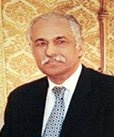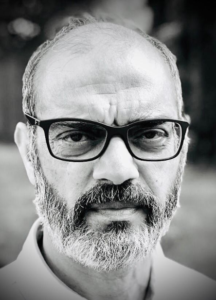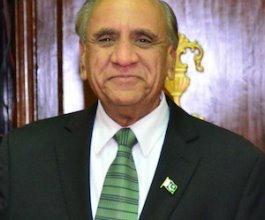CGR Profile and Team
CGR is a forum for studies and debate on strategic and tactical issues related with good governance and the rule of law. It is a non-governmental civil society advocacy centre dedicated to reforms in the justice and governance sectors.
As an independent think tank, CGR sets its own agenda, publishing and disseminating its findings regularly for national and global audience. Using an interdisciplinary approach, CGR brings together rule of law, justice and governance experts, researchers and internationally renowned professionals to animate its debate and research activities.
Headed by Tariq Khosa, Former Federal Secretary Narcotics Control Division, Director General Federal Investigation Agency and Inspector-General Police Balochistan, CGR aims to stand out as one of the rare Pakistani think tanks to position itself at the very heart of the debate on governance and justice issues.
CGR focuses on advocacy, research and studies in the following areas:
- Governance and Rule of Law
- Public policy
- Policing and Justice Sectors
- Serious and Organised Crimes
- Counterterrorism and Counter-Extremism (CT and CE)
Meanwhile, the National Initiative against Organised Crime (NIOC) launched in November 2019 continues as a Project from the platform of the Centre for Governance Research (CGR).
NIOC Advisory Board Members

Tariq Parvez
Expert, Serious and Organized Crimes, Former DG FIA
Staring his career in 1973 as Assistant Superintendent of Police, Mr. Tariq Parvez served the police service of Pakistan for more than 35 years with distinction and honor. His contributions in the field of counter terrorism as a police officer are unparalleled. He has been awarded the prestigious national award of Sitara- e- Imtiaz (Star of Excellence) by the President of the Islamic Republic of Pakistan for his immensely valuable contributions to peace and security of the country. He has served as head of the Federal Investigation Agency and also as National Coordinator, National Counter Terrorism Authority. His contributions as head of the Counter Terrorism Department of Punjab laid the foundations for an organized and highly professional counter terrorism efforts in the province of Punjab, which is host to about 100 million people. He has also served as Home Minister of the province of Punjab. He advises multiple international organizations in the field of counter terrorism, investigations, organized crimes and police reforms.
Email: [email protected]
 Zahid Hussain
Zahid Hussain
Security Analyst and Journalist
Zahid Hussain is a Pakistani journalist, writer and television analyst. He is a correspondent covering Pakistan and Afghanistan for The Times of London and The Wall Street Journal. His work has included assignments for Newsweek, Associated Press, The Economist and several other international publications. He also writes regularly for Pakistani daily newspaper Dawn and Newsline.
 Samina Ahmed
Samina Ahmed
Expert on National Security
Samina Ahmed is Senior Adviser Asia and Project Director, South Asia, for the International Crisis Group. Her work focuses on security and stability issues in South Asia, including security sector and criminal justice reform; insurgencies, militancy and jihadism; democratization, authoritarianism and governance; refugees and humanitarian crises; and the risks of regional conflict
Ahmed has a Ph.D. in Political Science and an MA in International Relations from the Australian National University. Prior to joining Crisis Group, she was a research fellow at the Kennedy School of Government, Harvard University and senior research analyst at the Institute of Regional Studies, Islamabad. She was a Peace Fellow at New York University, Abu Dhabi, and a visiting researcher at the Carnegie Endowment for International Peace, Washington DC, the Stockholm Peace Research Institute, and Oxford University.
Email: [email protected]
 Zubair Habib
Zubair Habib
Chief CPLC Sindh Karachi (Community Outreach)
Mr. Zubair Habib heads the Citizens-Police Liaison Committee (CPLC) Sindh as its Chief since July 2015. Mr. Habib is one of the founding members of CPLC Sindh. His association with CPLC goes back to 1989. CPLC also helps fight crime such as Kidnapping for Ransom, serious and gender based violent crimes, etc. It also maintains and analyses crime data to share with police for collaboration to fight organized crimes. CPLC also incorporates data of First Information Reports (FIRs) and data of prisoners lodged in jails of Sindh with biometrics. In 2006, the Government of Pakistan conferred the award of “Tamgha-e-Imtiaz” to Mr. Zubair Habib, in recognition of his services in fighting crime involving communities and through supporting the law enforcement departments. Mr. Zubair Habib has also served on the Board of Directors of multiple public and private sector organizations.
 Jawaid Akhtar QPM
Jawaid Akhtar QPM
Former Deputy Chief Constable of West Yorkshire Police
Jawaid is a Pakistan origin former Police Officer who retired as the Deputy Chief Constable of West Yorkshire Police, the fourth largest in the United Kingdom. As an Assistant Chief Constable he held the Operations Support portfolio before taking over the Specialist Crime (Major & Organised Crime) portfolio which included the Counter Terrorism Unit for the North East of England. He was also a member of a number of national working groups under the Association of Chief Police Officers.
As Deputy Chief Constable he was responsible for the overall performance of the force as well as strategic planning, corporate development and professional standards.
He was awarded the Queens Police Medal (QPM) for distinguished police service in the Queen’s Birthday Honours List in 2011.
He holds a B.Sc. (Hons) in Aeronautical Engineering and has a Diploma in Criminology from Cambridge University.

Dr Manzoor Ahmad
Expert on International Trade and Economic Crimes
Dr Manzoor Ahmad is an international trade and Customs expert. He is currently serving as the Chairman of a WTO trade dispute between the European Union and Indonesia. He is also a Senior Fellow with the Pakistan Institute of Development Economics (PIDE). Previously he has held various senior positions in the government and international organizations. These include Pakistan’s Ambassador to World Trade Organization; Director, Food and Agriculture Organization (FAO) to the United Nations at Geneva; Member Customs at Federal Board of Revenue, Islamabad; Deputy Director, World Customs Organization, Brussels and Chairman, Pakistan LNG Ltd. He started his career in 1973 with Pakistan Customs and Central Excise service. He is a regular columnist on economic and trade issues.
Email: [email protected]
CGR Directorate
 Tariq Khosa
Tariq Khosa
Director
Tariq Khosa has been actively involved in law enforcement since start of his service in 1973. During about four decades of serving in various supervisory and command positions in Police Service of Pakistan, he has actively been engaged in structural and operational reforms in the policing and justice sectors.
Before retirement, his last assignment as Federal Secretary of Narcotics Control Division in 2010-11 placed him at the pinnacle of government service in Pakistan.
He served as Director-General Federal Investigation Agency in 2009. As head of National Central Bureau, INTERPOL he won elections to serve as Delegate for Asia in the Executive Committee of INTERPOL from 2009 to 2012 and contributed to international police cooperation. He was actively associated in establishment of Interpol Global Complex of Innovation in Singapore.
He graduated from the National Defence College Islamabad completing his Masters in Defence and Strategic Studies in 2004–05.
He was a Hubert Humphrey Fellow under Fulbright Exchange Program at the Graduate School of Public Affairs in University of Washington Seattle in the United States of America in 1987-88.
He is a Member of the Global Initiative against Transnational Organized Crime, a Geneva-based network of professionals.
He is also the author of two books: “The Faltering State: Pakistan’s Internal Security Landscape” (Oxford University Press, 2017); and “Inconvenient Truths: Pakistan’s Governance Challenges” (Lightstone Publishers, 2019). His first book won the national Best Book of Year Award in Non-Fiction Category in 2019.
Email: [email protected]
 Sarmad Saeed
Sarmad Saeed
Former IGP GB and Additional IGP Punjab
Deputy Director
He joined the Police Service of Pakistan in 1980 and served in the provinces of Sindh and Punjab on different command and staff assignments. He served in Punjab as Additional IGP Training, Additional IGP Finance, and Additional Inspector General of Police, Punjab. He served Gilgit Baltistan as Inspector General of Police during the crucial period 2005-2007. He has served in the Intelligence Bureau for about 4 years where he specialized in counter-terrorism operations. He has also served in the UN Missions of Bosnia and Herzegovina for two years as a trainer and the Deputy Regional Commander and in the UN mission in Liberia as a trainer in the National Academy of Liberia.
After superannuation in 2014, he served with the Agency for German International Cooperation (GIZ) as the Group Security Consultant and Advisor External Affairs for the Packages Group of companies. Presently, he is the Deputy Director of the National Initiative against Organized Crime (NIOC).
He is a resource person and an advisor for various training institutes like the Civil Services Academy, National Police Academy, Management and Professional Development Department Punjab, Prosecution Academy, Punjab Public Service Commission, the National School of Public Policy, and other police training institutions. He has devised and delivered modules on various subjects for GIZ, UNODC, ICITAP, ICRC, and the Punjab Commission on the Status of Women.
Email: [email protected]
 Dr. Syed Kaleem Imam
Dr. Syed Kaleem Imam
Expert on Law and Governance
Chief Coordinator
Dr. Syed Kaleem Imam holds a PhD in Politics and International Relations, an LLM degree in Human Rights Law from SOAS, UK, and an LLB and master’s degree in Philosophy. He shares his understanding and research regularly at various training institutes and public forums, as well as in print and electronic media. He is the author of several publications both nationally and internationally.
A 33-year career of exemplary service characterized his career. A former police officer and Federal Secretary of the Narcotics Control Ministry, he is a civil servant with extensive experience in the field. His national experience includes serving as SSP in Islamabad, Rawalpindi, Quetta, Sibi and Nasirabad; Additional Director Immigration, Chief Security Officer to the Prime Minister, Deputy Director General, Intelligence Bureau, Director of National Public Safety Commission; Inspector General Islamabad, Punjab, Sindh, and National Highways and Motorways twice. During his time with the United Nations, he served as Chief of Operations in Mozambique, Planning Coordinator in Liberia, and UN Police Commissioner in Darfur, Sudan. He has been decorated with three UN peace medals, the Quaid Azam Police Medal, the President’s Police Medal, and the Tamagha-i-Imtiaz for national distinguished service. He is well-known as an academic, a security analyst, a strategist, and a policy practitioner.
Email: [email protected]
 Nawaz Nadeem
Nawaz Nadeem
Former Director INTERPOL FIA
Islamabad Coordinator
Dedicated former law enforcement officer having 30 years of experience in planning and managing investigations of Organized Crime (financial crime including corruption & money laundering, cybercrime, migration smuggling; human trafficking, violations of Intellectual property rights and terrorist financing) and international coordination & cooperation in the criminal matters (cybercrime, drug trafficking, financial crime, homicide, human trafficking, money laundering, and terrorism, etc.) of international ramifications. Strong leadership motivation in building result-oriented teams for specified tasks. Ample experience in project management and its budgetary implications (Opex and Capex) as well as operational management. Excellent in analysing the STRs in the suspected cases of money laundering and terrorist financing. Management of capacity building in collaboration of international organizations like ICPO-INTERPOL. Well-experienced in the collection and management of data and report writing. Having ample experience in information gathering/ communication and data handling. He led a component of EU-financed project “Fight against trafficking to/from Afghanistan with ECO countries, while posted as INTERPOL General Secretariat at Lyon, France.
Email: [email protected]
 Ammar Hussain Jaffri
Ammar Hussain Jaffri
Communications Strategist
Mr Ammar Jaffri has over 40 years of experience in Governance, Digital Forensics, Information Technology, Security, Education and Philanthropy. He has served and led different departments in the Federal Government of Pakistan and has been recognized with some of the highest industry honors in Pakistan as well as internationally. He serves as the Pakistan point of contract for a number of international initiatives on Cyber Security like the Microsoft Law Enforcement Forum G-8 24/7 High Tech Crime Network the OIC-CERT, SAARC CERT, APCERT, Council of the European Union and with INTERPOL. He retired as the Additional Director General of the Federal Investigation Agency of Pakistan in 2010 and is currently engaged in various public and private projects in a private capacity. He is a well-known speaker on a wide range of subjects including Information Security, Electric Governance, Business Continuity Planning, Electronic Banking and emerging trends in communication. Mr Jaffri’s goal is to improve lives in the rural areas of Pakistan by leveraging information and communication technologies.
 Saroop Ijaz
Saroop Ijaz
Legal Expert
Saroop Ijaz is a lawyer and a Senior Counsel for Asia, Human Rights Watch (HRW). He is also a member of the Human Rights Commission of Pakistan (HRCP). He has been appointed as amicus curiae in many significant constitutional cases such as the YouTube ban, Christian divorce act and the challenge to the local government act 2013 amongst others. He has formerly been the Chairperson of the Lahore High Court Bar Committee on International Human Rights. He has been a consultant and an advisor for the European Union, British Council, International Commission for Jurists, and various other organizations. He is also a member of the adjunct faculty at Lahore University of Management Sciences (LUMS). He has been a regular opinion writer and columnist at Pakistan’s two most influential English Language dailies – the Express Tribune and Dawn for over a decade and continues to contribute to notable local and international publications.

Hassan Sardar
Manager Administration and Finance
Hassan Sardar obtained his degree of MBA (Finance) from the Comsats Institute of Information Technology, Islamabad. Before that, he did his BBA (Hons.) in Finance from the University of Sargodha. He attended various workshops, seminars and conferences including USAID “Grantee orientation workshop” and “Operations Focused Training,” in Islamabad, and “Seminar on Dynamics of Youth and Terrorism: Understanding and Countering the Issue” in Kuala Lumpur, Malaysia. Mr. Sardar is a development professional with more than 12 years of professional experience in the Gulf and Pakistan in various fields including financial management, human resource management, and administration. He worked with many national and international organizations and successfully implemented many development projects in Pakistan. Besides it, Mr. Sardar is an excellent team builder with strong communication skills. He is performing the core management function at CGR.
Email: [email protected]
 Fatima Saif Khan
Fatima Saif Khan
Research Associate
Fatima Saif Khan is a scholar and researcher, holding an MPhil degree in International Relations from The Punjab University. She previously earned her Bachelor’s degree in International Relations and Politics from The University of Lahore, where she served as President of the Society of International Affairs. Currently, she works as a Research Associate at CGR, focusing on critical areas such as Counter Terrorism (CT), and Preventing Violent Extremism (PVE).

